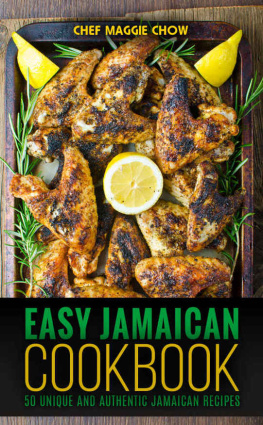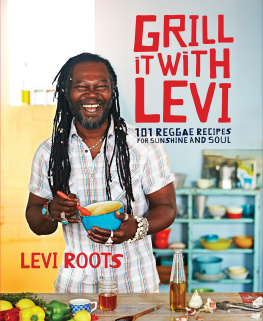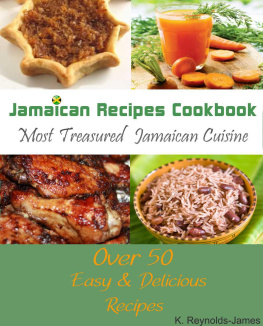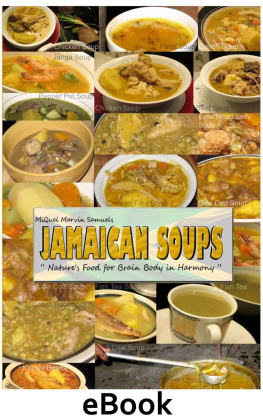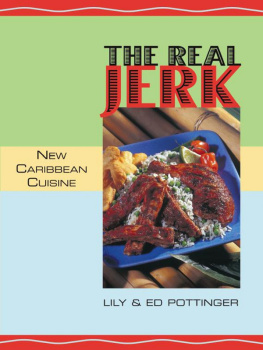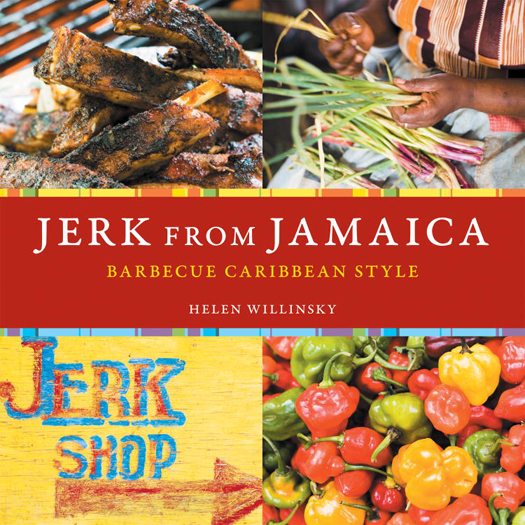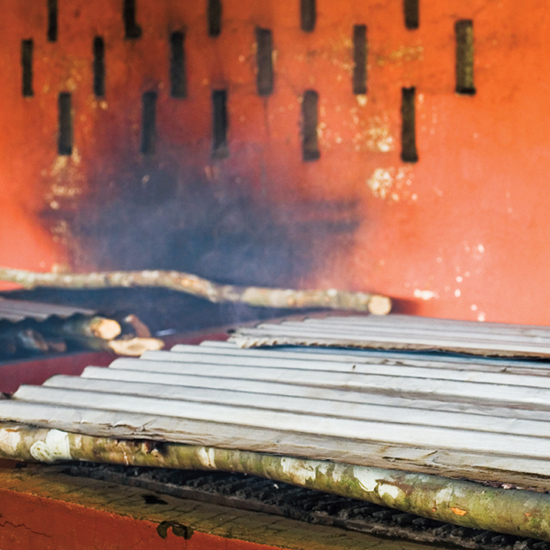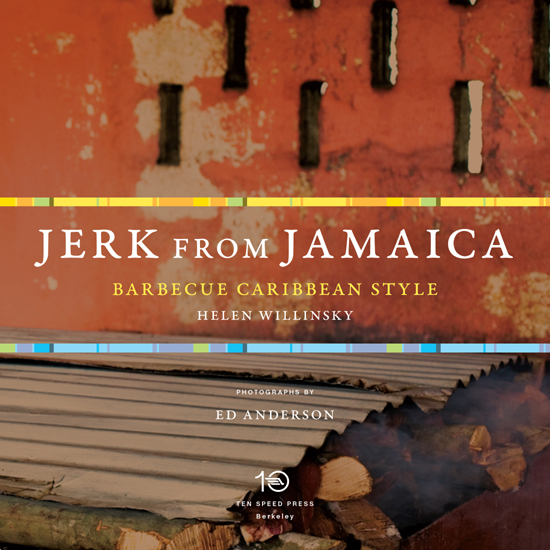Copyright 1990, 2007 by Helen Willinsky
Photography 2007 Ed Anderson
Foreword 2007 Virginia Burke
All rights reserved. Published in the United States by Ten Speed Press, an imprint of the Crown Publishing Group, a division of Random House, Inc., New York.
www.crownpublishing.com
www.tenspeed.com
Ten Speed Press and the Ten Speed Press colophon are registered trademarks of Random House, Inc.
The first edition of this book was published by The Crossing Press under the title Jerk: Barbecue from Jamaica in 1990.
Library of Congress Cataloging-in-Publication Data
Willinsky, Helen.
Jerk from Jamaica : barbecue Caribbean style / Helen Willinsky ; photography by Ed Anderson. Rev. ed.
p. cm.
Rev. ed. of : Jerk: Barbecue from Jamaica. Freedom, Calif. : Crossing Press, 1990.
Includes index.
1. Cookery, Jamaican. 2. Barbecue cookery. I. Willinsky, Helen. Jerk: Barbecue from Jamaica. II. Title.
TX716.J27W55 2007
641.597292dc22
2006037605
eISBN: 978-1-60774-458-0
Cover design by Ed Anderson
v3.1
ACKNOWLEDGMENTS
I would like to take a little space to acknowledge and thank some dear friends and colleagues who have been instrumental in helping to make jerk the national obsession it has become, and who shared some of their recipes with me for this new edition of Jerk from Jamaica.
Winston Stona, whose line of Busha Browne products has brought jerk flavors to barbecue lovers around the world, contributed recipes for .
Norma Shirley has taken Jamaican cuisine to a whole new level from her base, Normas on the Terrace at the Devon House. For this new edition, she graciously gave me recipes for .
Virginia Burke of Walkerswood, which started as a rural community cottage industry to create employment for its people, has taken jerk seasoning and helped move it into every nook and cranny in the countryside. For this new edition, she gave me .
Dennis Hayes has been a champion of this book from the very beginning; for this edition he also contributed his barbecue expertise and some wonderful recipes: .
PUBLISHERS NOTE
Some of the recipes in this book include raw eggs, meat, or fish. When these foods are consumed raw, there is always the risk that bacteria, which is killed by proper cooking, may be present. For this reason, when serving these foods raw, always buy certified salmonella-free eggs and the freshest meat and fish available from a reliable grocer, storing them in the refrigerator until they are served. Because of the health risks associated with the consumption of bacteria that can be present in raw eggs, meat, and fish, these foods should not be consumed by infants, small children, pregnant women, the elderly, or any persons who may be immunocompromised.
To my parents,
George and Marion


CONTENTS

FOREWORD
The secrets of jerk cooking were well kept for many years. Not until about thirty years ago did this delectable flavor indulgence reach the mainstream Jamaican table. Helen Willinsky was certainly part of this liberation, with her Helens Jerk products. Before the advent of commercially bottled seasoning, jerk pork or jerk-anything-else was basically street food and seldom made at home. Now jerk is enjoyed worldwide.
In this wonderful book Helen brings to light the essence of jerk cooking. Her accounts of authentic Jamaican life spill forth with adept storytelling ease as she takes the reader through jerks culinary history and her personal cooking experiences.
Jamaican food has the unfortunate reputation of being hot and only hot. Traditional jerk did nothing to dispel this notion, because a fiery jerk really is a thrill for those who love very spicy food. Helen, like most Jamaicans, knows the difference between hot and spicy, and teaches that you can turn up or lower the heat to your own desire. She builds basic recipes for making traditional jerk, then expertly deconstructs and reworks her recipes into an array of modern and innovative versions. The recipes in Jerk from Jamaica take you through the various spices and foodstuffs used in our cooking. Youll learn to use ingredients like ginger, tamarind, and coconut in savory dishes and flip out your taste buds without singeing them.
Like every cuisine, jerk is constantly evolving: great cooks are creative by nature and are influenced by new trends and popular cooking styles. Jerk used to refer only to a pig grilled slowly over a fire-pit of pimento wood. Nowadays when you say jerk, most people will assume the main ingredient could be chicken, pork, and maybe more. Helens recipes use a wide variety of meats and seafood, and they also allow for ingredient substitutions, all the while making sure you understand the roots and traditions of jerk cooking. Here youll find everything from meatballs to fajitas, from lobster to scallops to salmon.
Helens recipes also offer several cooking styles to choose from: she walks you through all the details of preparing barbecue, stovetop, or oven versions of jerk recipes, including dealing with gas fire, wood chips, and coals in a barbecue grill. Her selection of recipes takes into account her readers need to prepare all kinds of dishes, from a simple salad for two to more complex dishes for entertaining. There is a wonderful array of side dishes, like rice and peas and baked or fried plantains, which root the meals in Jamaican tradition, and a choice of fruity dipping sauces and chutney to accompany main dishes. Desserts include wonderful Jamaican flavors like coffee, lime, and rum, and there are drinks and cocktails to make your head spin. How about a Bloody Mary la Jerk for starters!
I think her recipe choices are heartwarming and family-friendly at the core. No doubt everyone with a copy of this book will find brand new enthusiasm for firing up the coals and doing a Jamaican ting.
Virginia Burke
Director of Marketing, Walkerswood Caribbean Foods
Author of Eat Caribbean and Walkerswood Caribbean Kitchen
December 2006
INTRODUCTION
WHAT IS JERK?




